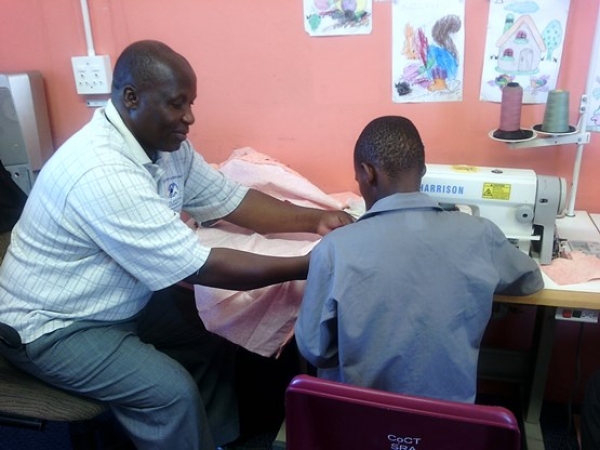Life line for kids in Nomzamo with special educational needs

Bishop Sibonile Gcilitshane and his wife, Pastor Lindiwe, created a life line for children who have special educational needs when they opened a skill centre in Nomzamo township near Strand.
Nceduluntu Skills Development Training Centre (N.S.D.T.C) was established for students with special educational needs and registered in August 2013. The couple started the center with only two students; after a few months, there were 18.
The school accommodates students between the age of 16 and 30 who have been rejected from the mainstream high schools or expelled from primary schools for being too old.
Children are taught skills such as sewing, carpentry, computing, crochety, cooking and other skills for a period of two years.
Bishop Gcilitshane says it was their son who inspired them to open the centre. Anele, who is now 22, showed signs of epilepsy at the age of 8. He repeated primary school grades numerous times. Then the family realised he had Down’s syndrome. They could not find a suitable school for him.
“We approached the ward councillor, Mbuyiselo Matha, who we pitched the idea to and he offered two rooms at the back of the hall and lent us six old computers that needed upgrading, community sewing machines, and an industrial overlocker to begin with,” says Gcilitshane.
During their research on intellectual disability they visited schools with learners who have special educational needs and discovered that slow learners are not well accommodated.

Sikhumbuzo Dingi and Siphiwo Monaheng doing upholstery. Picture by Zintle Swana.
“Disability schools accommodate severely mentally disabled children and not slow learners. The Department of Education does not allow a child to begin high school in mainstream schools after the age of 18, and it is possible for a slow learning child to be in grade eight at the age of 19 years,” he says.
Gcilitshane believes this is why mentally challenged children are found in the streets being targets of abuse, alcohol and drugs.
Jeremiah [surname withheld because he is under age], 16, was rejected from high school and could not go back to primary because he was considered too old. He was in grade 7 at the age of 15. He started at the centre last year in September after seeking a suitable school for himself.
“I could not go to high school because my marks were low, and I could not find the right school for myself, but after a while, I heard about Nceduluntu and I immediately registered.”
“This is a better place for me because I do not fit in anywhere else. Even in primary school, children would make fun of my age and [make] offensive comments. But I did nothing about it … Even if I reported them, the teachers would not listen to me,” said Jeremiah.
Bennelobe Makanana is a volunteer at Nceduluntu. She started in January a year ago. She said the only things the children need are love and attention.
“In our black communities children with disabilities are considered useless. We as parents treat them like they are nothing of value and that is why most of these kids end up aggressive; that rejection builds up anger inside them.”
“These kids can do a lot of things. They have skills, but they just need guidance and support, which is something they do not receive from parents,” she said.
Nosikathili July, who is one of the parents at the centre, says she would like to see the centre do well because it saved her daughter.
“We live in a township where a lot of things happen and my daughter is one of the targets because people know that she is mentally challenged. I cannot afford to take her to a private school and Nceduluntu has saved my child from a lot of bad things that could happen to her in this township,” she said.
Each student pays R150 per term, which is used for equipment and lunch. Gcilitshane says it is not even close to being enough; they are running the school without funding or help from the community.
GroundUp contacted the Department of Education regarding public schools for children with special needs.
Jessica Shelver, a spokesperson for the department, said there are skill centres for the disabled that are situated in various townships that could help such children, including Thembalethu, Nompumelelo, and Siviwe.
Gcilitshane says they need many things to develop the school. They’d like a bigger space and more equipment. They are working on accreditation of their modules so that they can issue certificates to students who have completed the courses.
“Our plan is to seek jobs for these students when they are ready to work or help them start their own businesses,” he says.

This article is licensed under a Creative Commons Attribution-NoDerivatives 4.0 International License.


